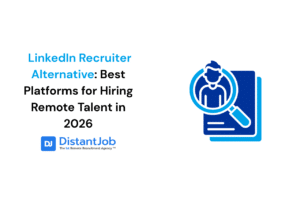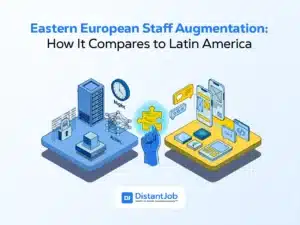Remote work has enjoyed steady growth over the years with an increasing number of people in the world ditching the traditional office setup and opting to work from home. The myth that remote employees aren’t as productive as the ones in a traditional setup keeps a lot of employers from adopting the remote work model. This myth might have been sparked by an employee who spilled his drink on his laptop and missed crucial deadlines while working remotely from a beachside hammock. Leave this worry aside because most of us aren’t that clumsy and this could have happened in a traditional set up too! I’ve seen employees spilling coffee all over important documents in an onsite office.. Let’s not make human errors so monstrous. Instead, let’s learn how to hire the right remote candidates.
The trick to busting this unwarranted myth is not whether to hire a remote worker, but discovering how to hire the right remote candidate who will work from a home office and not risk spilling mojitos on a stretch of PHP code.
The Traits and Temperament of Successful Remote Workers
Although technology has enabled most office tasks to be performed remotely (yes, even locking stationary closets. Hello, Internet of Things!), not all people will make it to the list when you hire remote candidates.
The difference between the guy on the hammock and the one in the home office is a matter of personality.
Certain kinds of people embrace remote work as a fish to water: meeting deadlines, communicating every day, producing top-quality work.
Others miss deadlines and forget meetings. These people may not be inferior in their skill set, but when left to work without the structure of an office, have difficulty keeping up.
That’s why it’s mandatory to hire the home-office pro remote worker who has certain unmistakable traits, such as:
1. Self-Starter:
This person will be motivated to work, even when no one’s looking. The right candidates will also show passion for their work field. They’ll be curious to learn and do more related to their role because they love their work.
2. Organized:
An excellent remote candidate should be able to create and follow their processes based on what makes them most productive. From planning the way in which they’ll break down a massive project to meeting multiple deadlines, being innately organized will help the remote worker focus on the work itself.
3. Responsible
A person who works because he’s conscientious and has a sense of responsibility towards his work and the company will perform well as a remote worker. This is important because managing remote employees can cost a company additional resources.
4. Proactive
A candidate who can work independently not only on jobs he’s been officially assigned but shows foresight and takes the initiative to complete related tasks will thrive in a telecommuting role.
5. Focused
Employees staying focused on their work is an issue that concerns most companies and particularly so for a distributed workforce. But of the employees working from home, those who can stay focused on their work despite distractions are a good bet for successful remote work.
6. Disciplined
Every employee who wants to work from home enjoys the notion of the freedom it affords them, from a social coffee meet in the middle of the morning to an afternoon of basketball with their kids. But the disciplined remote worker will carve out time in his day for work and won’t let distractions seep through.
7. Result-Oriented
Working remotely isn’t just about meeting deadlines, but producing top quality work within those time constraints. And a candidate who takes pride in the work he does is more than likely going to think about the results his work will produce, no matter where he works.
How To Hire Remote Candidates By Asking The Right Interview Questions
Events in the candidate’s past that demonstrate their ability to take the initiative, think creatively, solve problems, produce results, prioritize work, organize events, complete large projects, communicate well and be open to feedback – these could translate into an excellent potential remote candidate.
An interview when you hire remote candidates should consist of situational questions that’ll reiterate the above traits, logistics questions that’ll show the candidate’s preparedness for remote work, and knowledge/skill based questions that’ll demonstrate his ability to fill the role – all of which will together help in selecting the right remote worker.
Example of situational questions to ask:
- What would you do if you realized there was a part of a project you weren’t proficient in handling?
- Tell us about a time when you solved a problem/took the initiative without telling your manager?
- If you were stuck on a problem and couldn’t get hold of your manager or coworkers what would you do?
- If you were given a lot of data/research for a project and very little time to go through the materials, how would you go about it?
- Tell us about a time when you had urgent vs. important tasks, both with nearing deadlines, how did you go about prioritizing them?
Example of logistics questions to ask:
- Have you worked remotely before? What makes you a good candidate?
- What equipment/tools/apps are you familiar with that’ll ease your communication at work, meet deadlines, and track/save your work?
- How do you organize and prioritize tasks?
- How have you set up your home workspace?
- Run us through an example of your typical remote workday?
Notes about proficiency questions to ask when hiring remote workers:
Of course, remote candidate skill evaluations will vary for every job in every company. Still, while planning to hire remote candidates, what businesses need to find out is their level of comfort with every responsibility mentioned in the job description. This knowledge is a good predictor of how productive a remote employee will be. It is very important to assess their personal attributes in order to understand their overall outlook towards work and it’s management.
Another aspect of proficiency to check would be how a remote candidate can think creatively within that role – rather than merely execute what they are told. Creative thinking is a required skill when a remote worker may not have the option of virtual communication to discuss problems/solutions.
Candidates to Give a Miss When You Hire Remote Candidates:
Some candidates might be rightly qualified to fill a job responsibility, but they may not be suitable for flexible jobs. you need to analyze this carefully when planning to hire remote candidates. It’s equally important to keep an eye out for them during the hiring process and ask clarifying questions that will reveal their suitability for remote positions. Such as:
- Candidates who like things black and white, faced with ambiguity, will suffer indecisiveness when working on their own.
- People who need micromanaging may end up being less efficient with no one continually supervising their work.
- Introverted people who have difficulty communicating on a regular basis will find it difficult to keep up with internal processes like online meetings, daily reports or work progress.
- Remote workers who have honed in on the idea of “work anytime, anywhere” might struggle to be available for team communication during 9-to-5 work hours or even for any online collaboration.
As you might have guessed, picking the right candidate is part science, part art, and part magic. And possibly quite time-consuming. But fortunately, DistantJob has hundreds of elves, aka IT headhunters who are experts at finding remote candidates that will match your requirements perfectly. So don’t risk hiring the beach bum, get in touch with us today.





